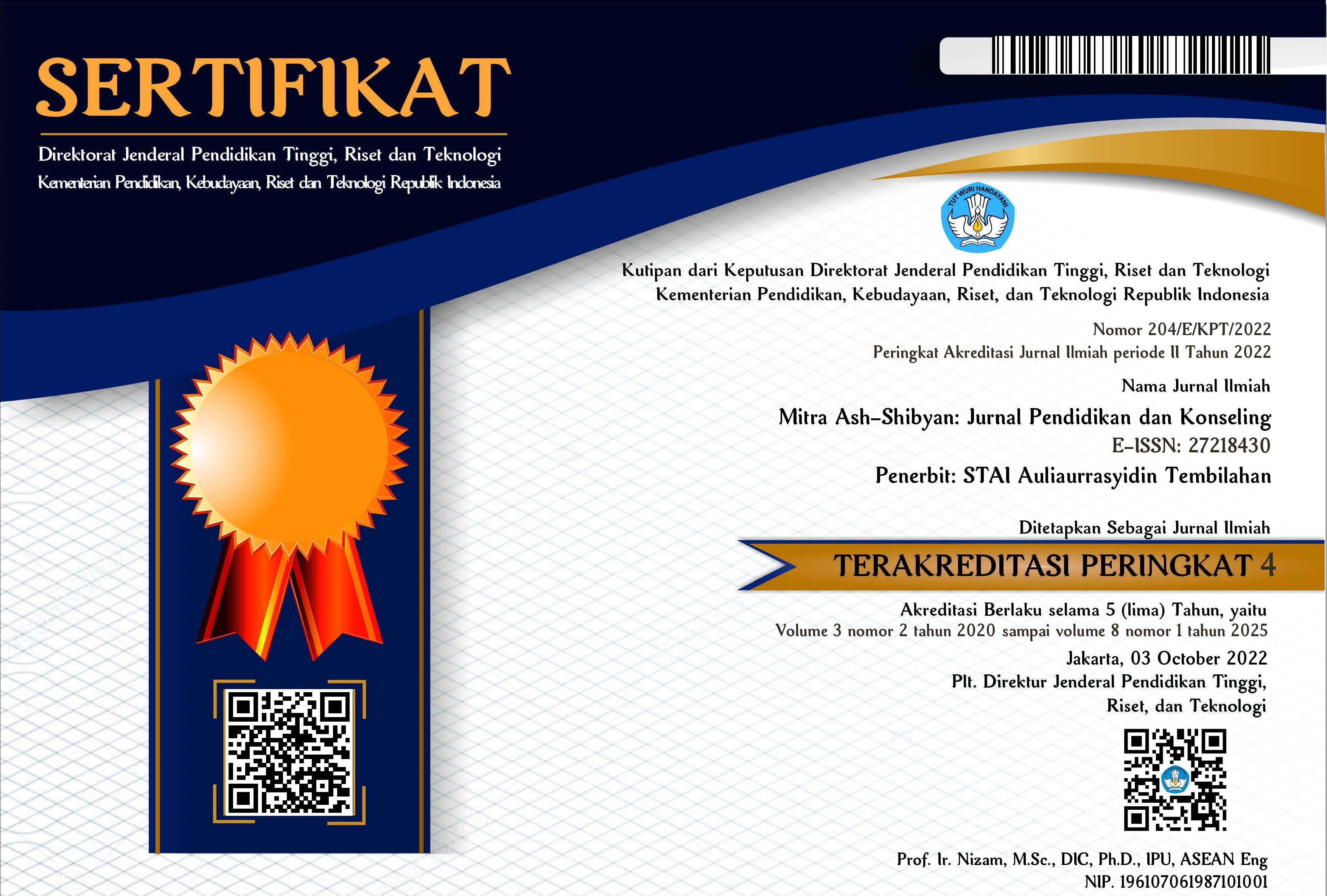Evaluasi Program Pendidikan Karakter di Pendidikan Anak Usia Dini
DOI:
https://doi.org/10.46963/mash.v7i01.1438Keywords:
Program evaluation, Character education, Early childhoodAbstract
Human being was created for the purpose of serving God with religion being the guide. Everyone must do self-introspection (muhasabah) to achieve these goals every year, month, day, or even every time. This study aims to evaluate the program of character education implemented in and achieved by PAUD Insan Karimah. This is qualitative research with the CIPP model (context, inputs, process, and product). The data were collected through in-depth interviews, document studies, and structured observations. The subjects in this study were the principal, class teacher, and art assistant teacher. The results showed that the program of character education at PAUD Insan Karimah was in the good category. This was shown by the completion of aspects of context, input, process, and product, as evidenced by the inclusion of character in the school's vision and mission, the existence of supporting facilities and infrastructure, the integration of programs through habituation activities, and the involvement of all parties in character education programs.
Downloads
References
Akbar, M., & Situmorang, R. (2020). Evaluating the Implementation of Strengthening Character Education Program using CIPP Model in Elementary Schools. Fthe International Conference on Education, Language and Society, Icels 2019, 20–25. https://doi.org/10.5220/0008993200200025
Dwi, Y. R., Haryono, & Florentinus, T. S. (2018). The Evaluation of the CIPP Model in The Implementation of Character Education at Junior High School. Innovative Journal of Curriculum and Educational Technology, 7(2), 65–77.
Faujiah, N., Muwarni, S., & Driana, E. (2021). Evaluasi Program Pendidikan Karakter Di Sekolah Dasar Islam Daarus Shofwah Bojonggede-Bogor. Jurnal Penelitian Dan Penilaian Pendidikan, 3(2), 9–20.
Jannah, M. (2019). Metode Dan Strategi Pembentukan Karakter Religius yang Ditetapkan di SDTQ-T An Najah Pondok Pesantren cindai Alus Martapura. Jurnal Pendididkan Madrasah Ibtidaiyah, : 4(1), 77–102.
Magdalena, I., Akbar, M., Situmorang, R., & Rosnaningsih, A. (2019). Evaluasi Program Gerakan Literasi Sekolah Di Sekolah Dasar Wilayah Kota Dan Kabupaten Tangerang. Pendas. Jurnal Ilmiah Pendidikan Dasar, 4(2), 230–248.
Mustari. (2014). Nilai Karakter Refleksi untuk Pendidikan,. Jakarta: PT Remaja Grafindo Persada.
Noor, J. (2017). Metodologi Penelitian. Jakarta: Kencana.
Rianawati. (2014). Implementasi Nilai-Nilai Karakter pada Pelajaran Pendidikan Agama Islam (PAI) Tingkat SLTA,. IAIN Pontianak Press.
Stufflebeam, D. L. (1996). IPP Evaluation Model Checklist: A Tool for Applying the CIPP Model to Assess Projects and Programs. Western Michigan University. https://scholar.google.com/scholar?hl=id&as_sdt=0%2C5&q=stufflebeam+cipp+evaluation+model&oq=Stufflebeam
Suyatno. (2010). Urgensi Pendidikan Karakter. Ditjen Dikdasmen-Kementerian Pendidikan Nasional.
Wardhani, R. S., Wiyanto, W., & Hartono, H. (2021). The Evaluation of Character Education Strengthening Program Based on Kemataraman Culture at Elementary School in Kulon Progo Regency. Journal of Primary Education, 10(3), 271–283.
Wijayanto, A. (2021). Akademisi dan Jurus Jitu Pembelajaran Daring. Tulungagung: Akademia Pustaka.
Yaumi. (2014). Pendidikan Karakter Landasan Pilar, dan Implementasi,. Prenadamrdia Grup.
Downloads
Published
Issue
Section
License
Copyright (c) 2024 Reni Apriani, Nurul Anriani

This work is licensed under a Creative Commons Attribution-ShareAlike 4.0 International License.
Authors who publish with this journal agree to the following terms:
1. Copyright on any article is retained by the author(s).
2. The author grants the journal, right of first publication with the work simultaneously licensed under a Creative Commons Attribution shareAlike 4.0 International License that allows others to share the work with an acknowledgment of the work’s authorship and initial publication in this journal.
3. Authors are able to enter into separate, additional contractual arrangements for the non-exclusive distribution of the journal’s published version of the work (e.g., post it to an institutional repository or publish it in a book), with an acknowledgment of its initial publication in this journal.
4. Authors are permitted and encouraged to post their work online (e.g., in institutional repositories or on their website) prior to and during the submission process, as it can lead to productive exchanges, as well as earlier and greater citation of published work.
5. The article and any associated published material is distributed under the Creative Commons Attribution-ShareAlike 4.0 International License







2.png)



